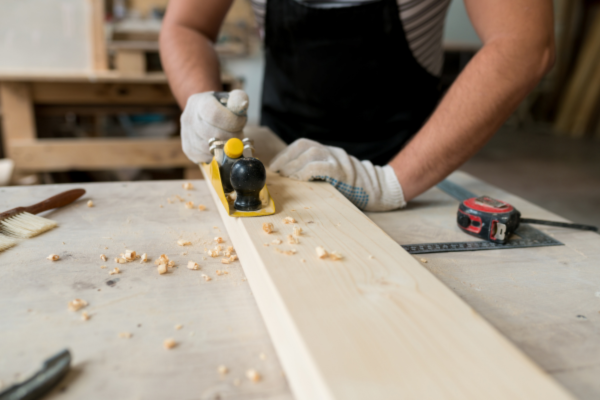Level 2 Carpentry NVQ: Is It Complicated?
The Level 2 Carpentry NVQ (National Vocational Qualification) allows carpenters to obtain formal recognition of their experience, as well as the CSCS Blue Card. But is the NVQ complicated?
The short answer is no, it’s not complicated- but it does take quite a lot of time and effort. With NVQs, you’re not learning new skills. You’re instead proving the skills you’ve already been mastering since you started work as a carpenter.
In today’s blog, we’ll be breaking down how exactly these qualifications work, the structure of Level 2 NVQs, how much experience you typically need before starting, the skills you’ll be assessed on, and everything else you need to know about how complicated the NVQ is.

1. What Does the Qualification Involve?
The NVQ is a competence-based qualification, designed to assess whether you can consistently perform the duties of a skilled carpenter to the national occupational standard. The process involves compiling an online portfolio of evidence that demonstrates your proficiency across a range of mandatory and optional units. These units cover the foundational work of the trade, including roofing, framing, hanging doors, and fitting skirting boards. The qualification is entirely focused on verifiable practical performance, ensuring that you’re evaluated on what you do on a real-world site, rather than just what you can recall in a classroom.
2. Understanding the Level 2 Carpentry NVQ Structure
Level 2 is structured around units that align directly with core site tasks. These typically include mandatory units such as setting up and maintaining a safe working area, and carrying out first and second fix operations. The structure is designed to be highly practical. For instance, a candidate might need to prove competence in:
- First Fix: Erecting structural carcassing components (roofing, timber framing).
- Second Fix: Installing doors, windows, ironmongery, and internal mouldings (skirting boards, architraves).
- Health and Safety: Demonstrating consistent adherence to safety law and procedural compliance.
The modular structure allows the assessor to break down the role of a carpenter into manageable units.
3. How Much Experience Do You Need Before Starting?
The NVQ is not for beginners. While there are no formal academic prerequisites, candidates should have considerable on-site experience (typically a year at least) working as a carpenter or advanced trainee. The qualification is built on the principle of Recognition of Prior Learning (RPL). If you lack the necessary experience, you won’t be able to compile the evidence required to satisfy the assessment criteria, so the process would be impossible to complete. Most training providers, including CST Training, will only allow you to begin an NVQ if you clearly have the experience required.
4. Level 2 Carpentry NVQ: Skills You’ll Be Assessed On
The core challenge of the NVQ is proving technical proficiency and accuracy across essential tasks. Skills assessed include:
- Accuracy and Measurement: Consistently working to specified tolerances, ensuring all installations are plumb, level, and square.
- Fixing Techniques: Correctly installing ironmongery and skirting with minimal visible fixings.
- Structural Understanding: Knowledge of structural integrity when installing timber frame elements and roof components.
- Tool Competence: Safe and efficient use of hand tools, power tools, and static machinery relevant to the trade.
- Interpretation: The ability to read and accurately work from technical drawings and specifications.
The assessment requires verifiable evidence of these skills being applied consistently over time.
5. Is the NVQ Suitable for Newer Carpenters?
A newer carpenter, lacking the full range of experience, would be better served by pursuing a structured apprenticeship or a college-based course (like a Level 2 Diploma or City & Guilds) first. The NVQ is most efficient for candidates who don’t have formal college education but have gained proficiency through sustained work.
6. Level 2 Carpentry NVQ Requirements Explained
The mandatory requirements are entirely practical:
- Sustained Employment: You must be working in the carpentry trade to generate evidence.
- Verifiable Evidence: You must collect documentation, photographs, and videos of your work.
- Assessor Access: You must be able to arrange remote site observations for your assessor.
These requirements confirm that the NVQ is a work-based professional validation, demanding real-world application.
7. How Long Does the NVQ Typically Take?
Since it’s not a course, there are no fixed deadlines. Many candidates take several months, but at CST Training, the more motivated candidates can often complete a Level 2 NVQ in as little as four to eight weeks.
8. Level 2 Carpentry NVQ Assessment Methods
The NVQ utilises multiple assessment methods to provide a holistic view of competence:
- Portfolio Review: Examination of all submitted documentation (site diaries, method statements, photos).
- Remote Observation: The assessor remotely observes the candidate performing specific, complex tasks safely, and accurately.
- Professional Discussion: A structured interview to confirm the candidate’s underpinning knowledge, procedural understanding, and ability to justify their technical decisions.
- Witness Testimonies: Signed statements from line managers or supervisors verifying the candidate’s performance.
These methods collectively ensure that the final certification is a reflection of the carpenter’s competence, and consistency.

9. What Type of Evidence Do You Need to Provide?
The portfolio requires a diverse mix of evidence to prove competence across all units. This includes:
- Visual Evidence: Annotated photographs and short video clips showing before, during, and after stages of tasks (e.g., fixing a roof structure, hanging a door).
- Procedural Evidence: Copies of risk assessments and method statements relevant to the work performed.
- Testimonies: Signed statements from your employer verifying specific skills demonstrated on certain dates.
- Reflective Accounts: Your written explanation detailing the planning process, materials used, and safety considerations for key tasks.
The evidence must be authentic, verifiable, and clearly linked to the NVQ criteria.
10. Level 2 Carpentry NVQ: Common Challenges
Candidates frequently encounter two primary challenges during the process:
- Evidence Gaps: Struggling to find suitable work to cover every specific unit (e.g., a candidate working only on second fix may struggle to find evidence for roof carcassing).
- Documentation Discipline: The administrative requirement to continuously annotate, organise, and submit evidence, which contrasts sharply with the physical nature of the trade.
- Assessor Access: Coordinating remote observations.
These hurdles are all manageable with proactive planning, and consistent communication with your assessor.
11. How Supportive Are NVQ Assessors?
The assessors are highly supportive and act as guides and mentors, not examiners. They are qualified professionals with trade experience who are dedicated to helping the candidate succeed. Their role is to interpret the NVQ standards, provide clear instructions on what evidence is missing or weak, and help the candidate plan their remaining work to cover the necessary units. Regular, open communication with your assessor is the single most effective way to accelerate the process, and avoid misdirected effort.
12. Level 2 Carpentry NVQ Portfolio Tips
To create an effective portfolio, remember that organisation is key. Annotate all photos immediately after they’re taken, clearly explaining what the photo shows and how it relates to the NVQ criterion. Prioritise quality over quantity; one piece of strong, verifiable evidence is better than ten vague, unannotated photos. A well-organised portfolio speeds up the assessor’s verification process immensely.
13. Is the NVQ Harder Than People Expect?
The NVQ can be harder than people initially expect, not because the carpentry work itself is harder, but because of the rigor of the documentation and verification. Many experienced tradespeople assume their years of experience will be enough, but they are often surprised by the detailed evidence required to prove consistent competence in areas like safety procedure and setting out. The difficulty lies in the formal process- proving you meet the standard, which requires discipline that may be new to a hands-on tradesperson.
14. Level 2 Carpentry NVQ for Experienced Tradespeople
For an experienced tradesperson, the NVQ is the most efficient path to formal recognition. The process allows them to bypass lengthy college courses and achieve certification based on their existing, proven skills. While the documentation may be a challenge, the practical observation units should be straightforward, turning a long career into a certified qualification in a matter of months. The NVQ is the perfect mechanism for converting experience into the official credential needed for senior site access.
15. What Happens If You Struggle with the Evidence?
If a candidate struggles to provide evidence for a specific unit (e.g., complex roofing if they only work on internal fixings), the assessor will work with them to develop an action plan. This might involve asking the candidate to seek specific, temporary work that allows them to gain and document the missing skill. The goal is always to help the candidate complete the qualification, provided they show sustained motivation and capability.
16. Level 2 Carpentry NVQ: How to Stay Organised
To maintain organisation for the Level 2 NVQ, integrate the portfolio into your working week. Use digital tools for immediate capture. Designate a specific 30-minute slot each week for review and annotation. Communicate regularly with your line manager so they know when you need witness testimonies signed. By treating the NVQ as a parallel project, you ensure a steady flow of evidence, and prevent the overwhelming accumulation of admin.
Conclusion (Level 2 Carpentry NVQ: Is It Complicated?)
The NVQ is not complicated in its concepts, but it’s rigorous in its process. It’s a necessary and highly effective tool for career advancement, designed to validate the skills of experienced tradespeople.

If you still have any questions regarding the NVQ, then do not hesitate to get in touch.
Phone – 020 3488 4472





